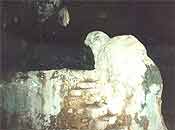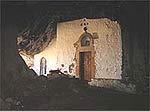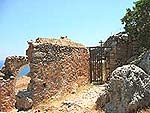| On
your way towards Katholiko Monastery you pass the Bear Cave
in
which there is a big stalagmite, resembling a bear bending over the big
cistern in the cave. According to tradition a living bear was originally
drinking from the water. The monks from Gouvernetou Monastery and the
local inhabitants had never seen it, but because they wondered, why the
cistern was always empty, some of the monks decided to keep watch inside
the cave to find the reason.
They were terrified, when suddenly the entrance was darkened by the big
bear, and one of them quickly invoked Virgin Mary. He had hardly finished
his prayer, when the bear became petrified.
|

|

|
The
cave was in fact the home of the worship of Artemis in the shape of a bear
as early as in Antiquity. But now you see a little church built into the
rock. It is dedicated to Ypapanti toy Christou (the presentation of Jesus
in the temple of Jerusalem), which is celebrated on February 2nd with a
procession and a subsequently Mass for believers from all of Crete.
|
| Five
plaques are built in above the door of the church, in the shape of a cross.
They bear the shield of the Kallergis family, one of the most prominent
families as early as in the Venetian period.
|
| Outside
the cave are a few ruins of the old Panagia
tis Arkoudias monastery (The bear-fighting Virgin Mary) from the 16th
century.
|

|
| Like
most of the monasteries in the area, the Bear monastery emerged from the
home of a hermit. The last hermit - Gerasimos Glyniadakis - lived here
until 1915. In addition to his religious works he was busy repairing the
paved path up to Gouvernetou Monastery and restoring the monastery. |
|
|
|
|
